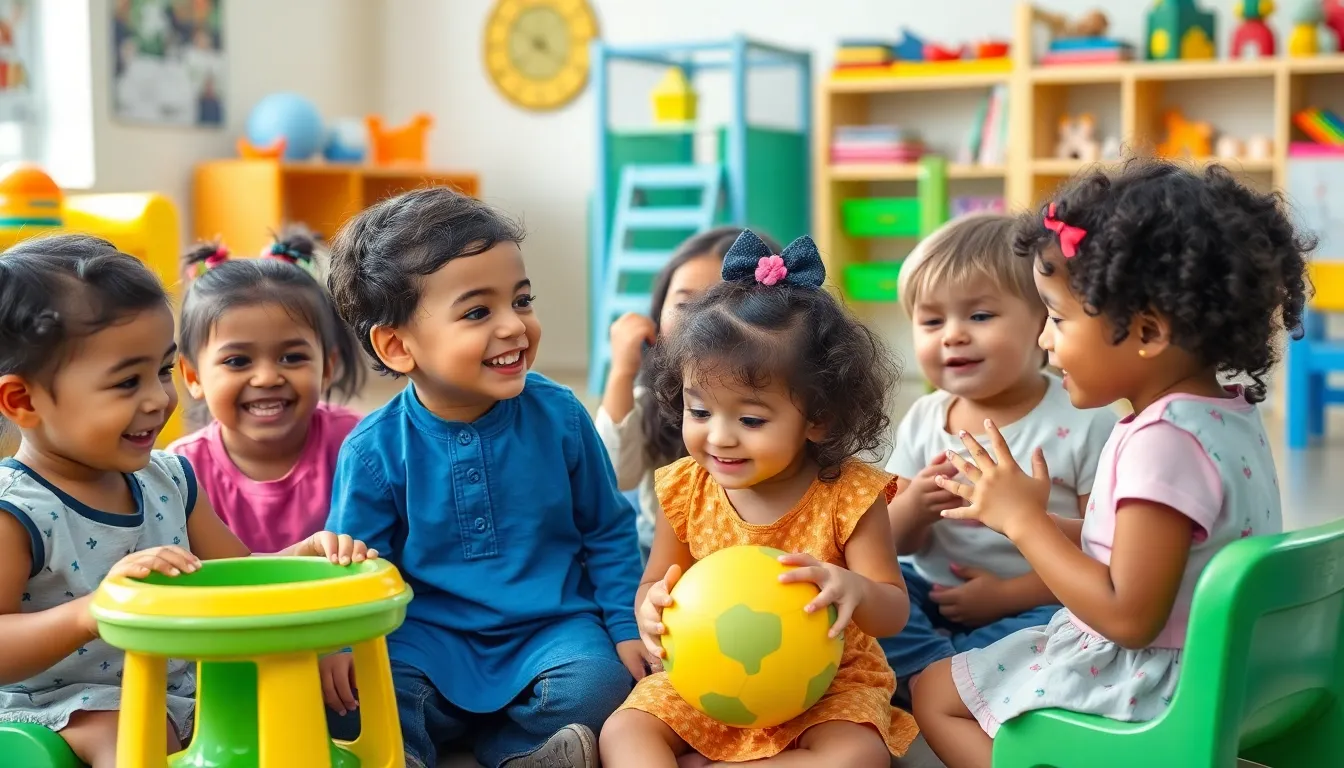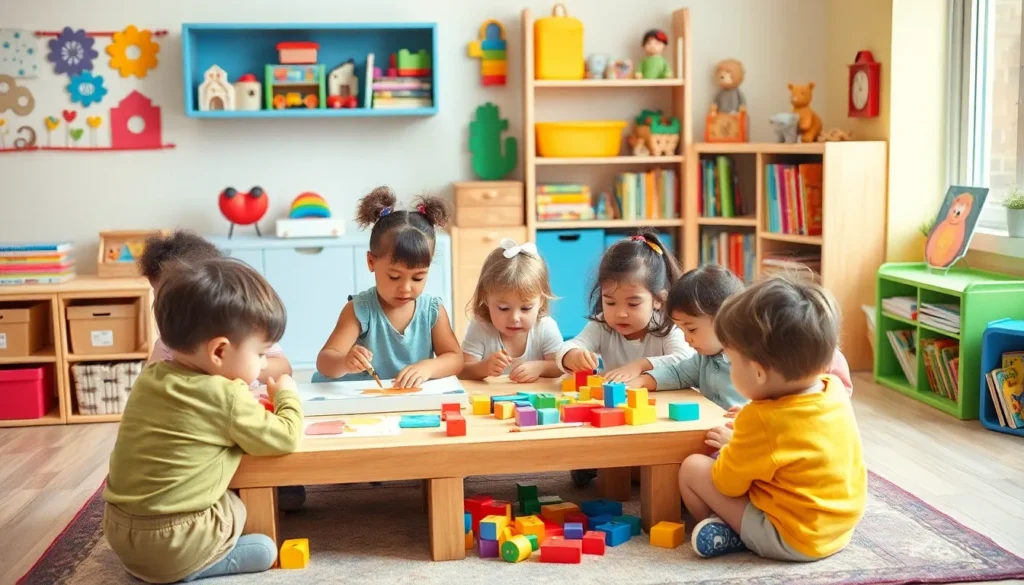Table of Contents
ToggleChoosing between daycare and staying at home for child development can feel like picking between chocolate and vanilla—both have their perks, but which one really serves up the best scoop for your little one? Parents often find themselves in a tug-of-war with their hearts and minds, weighing socialization and early learning against the cozy comfort of home.
In this showdown, the stakes are high: will your child emerge as a social butterfly or a homebody philosopher? From the giggles shared at daycare to the one-on-one snuggles at home, each option has its own unique flavor. Join the discussion as we dive into the delightful chaos of daycare versus stay-at-home parenting, helping you decide which path might just be the cherry on top of your family’s sundae.
Overview of Child Development
Child development encompasses physical, cognitive, emotional, and social growth from birth through early childhood. Developmental milestones mark significant achievements, helping caregivers assess a child’s progress. Growth typically unfolds in stages, with each phase influencing subsequent skills.
Physical development includes motor skills, such as crawling and walking. Children refine coordination and balance during these crucial early years. Cognitive development involves language acquisition and problem-solving skills. Interactive learning experiences propel cognitive growth during this stage.
Emotional development plays an essential role in helping children understand and express feelings. Strong attachments to caregivers build a foundation for emotional security. Social development occurs as children engage with peers, fostering communication and cooperation skills. Shared interactions at daycare settings provide these opportunities.
Daycare often offers structured learning environments, promoting social skills. Children learn to navigate group dynamics, sharing toys and ideas with their peers. In contrast, a stay-at-home setting enables personalized attention and tailored experiences. One-on-one interactions can enhance emotional bonding and cognitive focus.
Research indicates that experiences during early childhood significantly shape brain development. Quality interactions, whether in daycare or at home, support learning and growth. Both environments present unique benefits, depending on a child’s needs and family values. The decision between daycare and staying at home depends on individual circumstances and desired developmental outcomes.
Daycare Benefits

Daycare offers numerous advantages for child development, particularly in the areas of socialization and structured learning.
Socialization Opportunities
Socialization stands out as a fundamental benefit of daycare. Children engage with peers, fostering relationships that enhance their social skills. They practice sharing, taking turns, and resolving conflicts during daily interactions. Observing different personalities cultivates empathy and understanding. Children adapt to group settings, which promotes cooperation and teamwork. Daily routines provide consistent opportunities for collaborative play. Engaging in group activities, such as circle time or art projects, encourages communication and expression. Through these interactions, children develop essential social competencies that support their overall growth.
Structured Learning Environments
Structured learning environments in daycare significantly contribute to a child’s cognitive development. Daycare programs often incorporate early literacy, numeracy, and creative activities in their curriculum. Children engage with educational materials and participate in guided lessons that stimulate curiosity. Trained caregivers introduce age-appropriate learning objectives, promoting hands-on exploration and discovery. This approach reinforces essential skills while maintaining an engaging atmosphere. Regular schedules help children understand routines and time management. Through diverse experiences, daycare nurtures a love for learning that can last a lifetime.
Stay at Home Advantages
Staying at home offers several distinct benefits for child development, focusing on personalized care and nurturing environments.
Individual Attention
Individual attention significantly enhances a child’s developmental experience. Being at home allows caregivers to tailor interactions to meet each child’s unique needs, fostering deeper emotional connections. Children often benefit from one-on-one engagement, which amplifies learning opportunities and builds confidence. Customized activities promote cognitive growth, allowing parents to focus on specific developmental milestones. Parents can adapt learning pacing according to the child’s understanding, ensuring mastery of foundational concepts.
Flexible Schedules
Flexible schedules provide additional advantages for families choosing to stay at home. Parents can create routines that align with their child’s natural rhythms, making transitions smoother. Without the constraints of daycare hours, families enjoy spontaneous outings and leisurely activities, enriching the child’s learning environment. Opportunities to engage in community programs become accessible, allowing for diverse experiences and social interaction. Additionally, this flexibility supports family bonding, with time earmarked for shared activities that strengthen relationships.
Factors to Consider
Several factors influence the choice between daycare and staying at home for child development. Evaluating a child’s personality and family dynamics plays a significant role in making an informed decision.
Child’s Personality
A child’s personality affects their adaptability to different environments. Some children thrive in social settings, gaining confidence and skills from interactions with peers. Others may prefer the familiarity and comfort of home, where they can explore their interests at their own pace. Factors such as shyness, energy levels, and social preferences contribute to this decision. Parents might notice their child’s reactions in group settings to guide their choice. Observing these traits helps tailor the approach to best support a child’s growth.
Family Dynamics
Family dynamics shape the overall learning environment. Schedules, parental involvement, and the presence of siblings or extended family play crucial roles in relating to each option. Families with flexible work arrangements might find staying at home appealing, enabling richer engagement in daily activities. Conversely, families seeking structured routines may lean towards daycare for consistent learning experiences. Assessing the family’s prioritization of education, quality time, and emotional support influences which environment may best benefit the child’s development. Balancing these aspects helps parents make a choice aligned with their family’s values and goals.
Choosing between daycare and staying at home for child development is a deeply personal decision. Each option presents distinct advantages that cater to different family needs and children’s personalities. Daycare offers structured learning and socialization opportunities that can enhance a child’s cognitive and emotional skills. On the other hand, staying at home provides a nurturing environment that fosters strong emotional bonds and personalized attention.
Ultimately, parents should weigh their individual circumstances and consider what aligns best with their child’s unique needs. Whether opting for daycare or home care, both pathways can significantly impact a child’s growth and development, shaping their future in meaningful ways.




